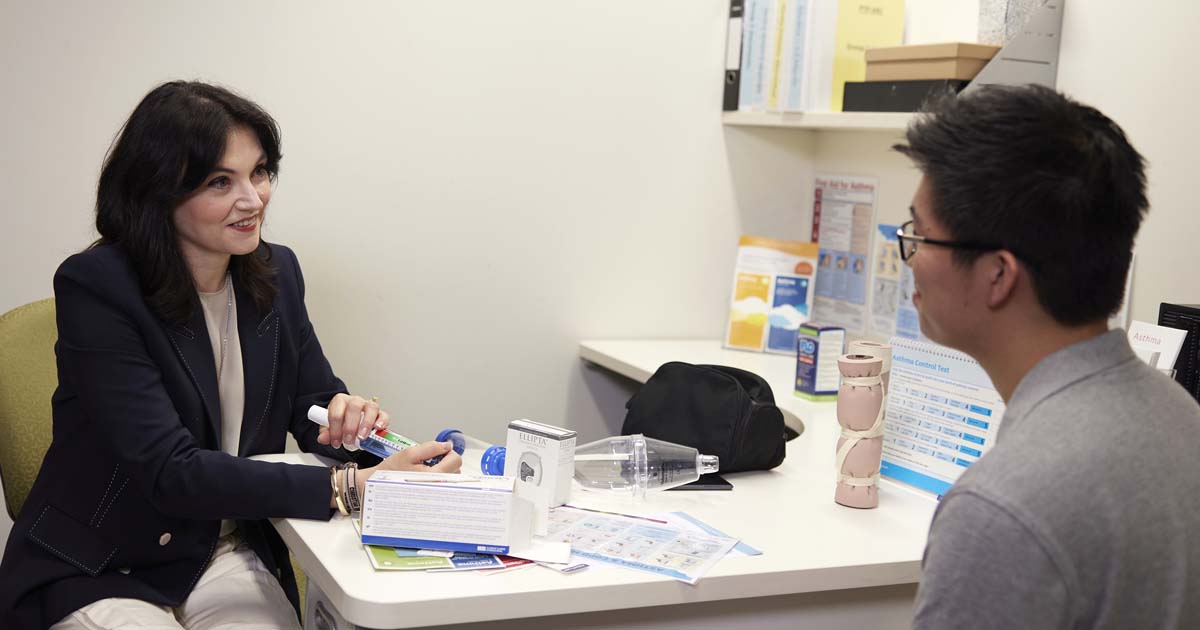The Woolcock Institute of Medical Research

Pharmacists poised to get massive respiratory care boost
Australians living with asthma and other chronic respiratory conditions will soon get more coordinated, effective care from their local pharmacist thanks to a new specialist task force.
The task force, chaired by Woolcock Institute of Medical Research respiratory expert Professor Sinthia Bosnic-Anticevich, will ensure community pharmacists are better supported to educate people about respiratory conditions, support correct medication use and identify those high risk patients who need additional medical care.
"Pharmacists are uniquely positioned at the coal face to identify the key issues with a person’s asthma or COPD and direct them towards the right kind of care," Professor Bosnic-Anticevich explained.
"They have far better access to patients than any other healthcare provider, but too often this access is underutilised, and opportunities to check, monitor and advise both patients and prescribers are lost.
"Through the formation of this specialist task force, pharmacists will be better informed about new emerging treatments and changes in disease management guidelines, and better able to effectively help these patients," she said.
The Respiratory Pharmacy Task Force, established by the Pharmaceutical Society of Australia, as part of the Respiratory Care, Community of Special Interest, is made up of pharmacy respiratory experts, leaders within the pharmacy profession, consumers, respiratory physicians, GPs, and representatives from the Lung Foundation Australia, National Asthma Council and Asthma Australia. It is headed by Professor Bosnic-Anticevich, a global expert in respiratory medicines use, and includes fellow Woolcock pharmacy specialist, Professor Bandana Saini. The Taskforce will meet over the next two years to focus on asthma management initially and then extend to COPD.
Among the most important objectives, the task force will set up a specialist respiratory leadership team that will keep pharmacists abreast of the latest disease and treatment developments. It will also establish a highly organised national network of community pharmacists to engage with on respiratory issues, and seek feedback on the current status of asthma management in pharmacies through a national survey.
"We’ll also be articulating the key skills and knowledge that every practising pharmacist needs in order to meet the modern day needs of patients with respiratory issues, and then working with accrediting bodies to ensure the profession can acquire these new competencies," Professor Bosnic-Anticevich said.
"Importantly, the group will also build a community of respiratory pharmacist experts who can communicate key messages around asthma and COPD and support education initiatives across Australia.
"Through these various pathways, we’ll be ensuring that our local pharmacists are more knowledgeable, well skilled and better supported to help those patients with asthma and COPD that pass through their doors," she says. "For many people with asthma and COPD, a pharmacist is the health professional they see more than any other. Our plan is to utilise that treatment opportunity far better than we have before."
The inaugural meeting of the Respiratory Task Force was held today on World COPD Day. Chair of the PSA Contemporary Community Pharmacy Practice Community of Specialty Interest and PSA Board Director, Dr Fei Sim, noted: "This is a timely reminder to Government that community pharmacists are often the first health care professional a patient sees when they have respiratory symptoms or allergies. They are vital in supporting patients, ultimately preventing hospital admissions, of which COPD is the second leading cause of hospitalisations in Australia."
Find out more
- We're looking for people with COPD to help with our research. Volunteer for our PIFomt study
- The task force’s key objectives
- About Sinthia
- More news about our respiratory research










